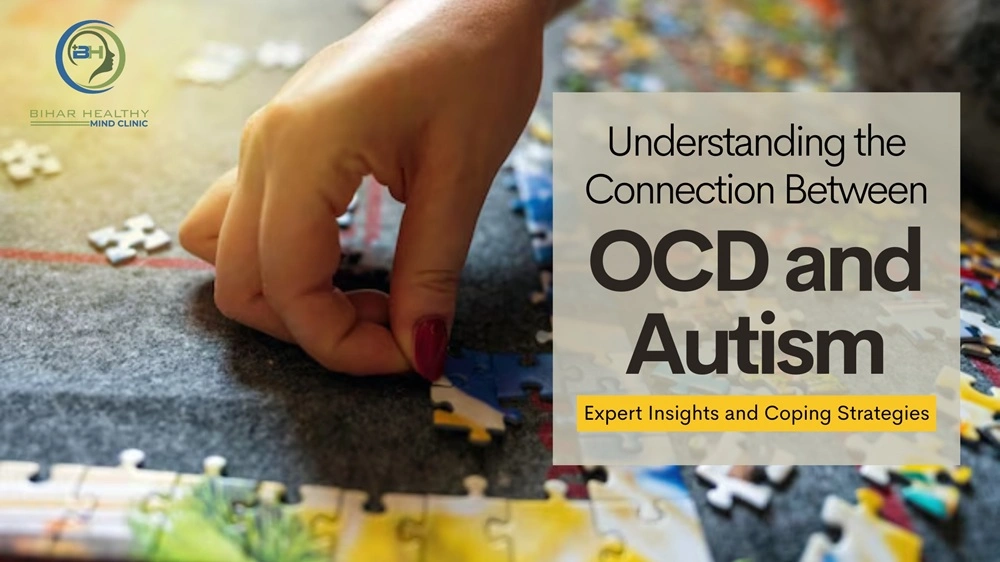

Mental health research continues to explore complex overlaps between different psychiatric and neurodevelopmental conditions. One such intriguing intersection exists between Obsessive-Compulsive Disorder (OCD) and Autism Spectrum Disorder (ASD). Both conditions can present overlapping behaviors such as repetitive actions, rigid routines, and social challenges, but their underlying causes and experiences differ significantly.
At Patna Psychiatry, under the expert guidance of Dr. Saurabh Kumar, MD (Psychiatry), widely regarded as the best psychiatrist in Patna, patients receive detailed assessment and individualized care for both OCD and Autism. This blog aims to clarify the link between these two conditions and provide practical strategies for better management and understanding.
Obsessive-Compulsive Disorder (OCD) is a mental health condition characterized by unwanted, intrusive thoughts (obsessions) and repetitive behaviors (compulsions) performed to ease anxiety or distress. Individuals with OCD often recognize their thoughts as irrational but find them difficult to control. Common symptoms include excessive hand washing, checking, counting, or organizing rituals that disrupt daily life.
Autism Spectrum Disorder (ASD) is a neurodevelopmental condition that affects communication, social interaction, and behavior. People with autism may exhibit restricted interests, repetitive behaviors, and difficulty adapting to changes in routine. Autism is a spectrum, meaning that its severity and symptoms vary widely from person to person.
Although OCD and autism are distinct diagnoses, studies reveal significant overlap between the two. Research suggests that around 17% of individuals with autism also experience symptoms of OCD. The overlap may arise due to similarities in brain structure, neurotransmitter imbalances (particularly serotonin and dopamine), and genetic factors that affect both conditions.
The repetitive behaviors in both disorders can appear similar, such as strict adherence to routines or repetitive movements.
However, the intent behind these behaviors differs:
Understanding this distinction is crucial for accurate diagnosis and appropriate treatment.
| Aspect | OCD | Autism |
| Core Nature | Anxiety-driven disorder | Neurodevelopmental condition |
| Cause of Repetition | To reduce anxiety or fear | For sensory or emotional regulation |
| Awareness | The person usually realizes the behavior is excessive | The person may see the behavior as natural |
| Treatment Approach | Focuses on managing anxiety and compulsions | Focuses on behavioral, communication, and social skills |
Recognizing these differences helps mental health professionals design personalized interventions suited to each individual's needs.
In some individuals, OCD and Autism coexist, making diagnosis and treatment more complex. When both are present, the person might experience heightened anxiety, more rigid routines, and difficulty in social or emotional expression.
Accurate diagnosis requires careful evaluation by a qualified psychiatrist or clinical psychologist. At Patna Psychiatry, comprehensive psychological assessments help differentiate overlapping symptoms and create customized care plans that address both conditions effectively.
Treating and managing OCD and autism together requires a holistic, multi-disciplinary approach involving behavioral therapy, medication (if needed), and supportive interventions. Here are some key strategies used by mental health professionals:
CBT helps patients recognize and challenge intrusive thoughts, replacing them with balanced, rational responses. For individuals with autism, CBT can be modified to suit communication levels and cognitive styles.
ERP is a specialized form of CBT used for OCD. It involves gradual exposure to anxiety-provoking situations without engaging in compulsive rituals, helping individuals build tolerance and reduce fear responses.
For autistic individuals, ABA helps in reinforcing positive behaviors and reducing harmful or unproductive habits through structured interventions.
People with autism often experience sensory processing difficulties. Sensory integration therapy helps them adapt better to sensory inputs, which can indirectly reduce compulsive or repetitive responses.
Family understanding plays a vital role in recovery. Educating family members about OCD and autism ensures they can provide appropriate support and minimize triggers at home.
When necessary, psychiatrists may prescribe medications like SSRIs (Selective Serotonin Reuptake Inhibitors) to help regulate anxiety and mood disturbances in OCD. Medication plans are always individualized based on the patient’s diagnosis and response.
For individuals on the autism spectrum, social skills training helps them navigate interpersonal relationships and build confidence, improving overall quality of life.
If you or your loved one shows symptoms of repetitive behavior, extreme anxiety, or difficulty adapting to change, it’s crucial to seek professional guidance. Early intervention significantly improves treatment outcomes.
At Patna Psychiatry, patients benefit from expert evaluation and compassionate care by Dr. Saurabh Kumar, the best psychiatrist in Patna, who specializes in diagnosing and managing complex conditions like OCD and Autism.
The connection between OCD and Autism is complex but manageable with the right understanding and treatment approach. While the two conditions share overlapping traits, they require distinct yet complementary therapeutic methods. With professional care, individuals can lead fulfilling, balanced lives.
For expert guidance on managing OCD and Autism, visit Patna Psychiatry, where evidence-based treatment and personalized care go hand in hand.
Visitors: 36
No comments yet. Be the first to comment!